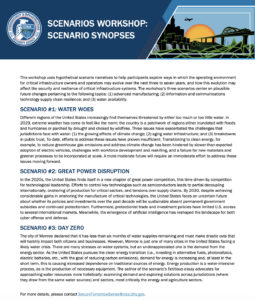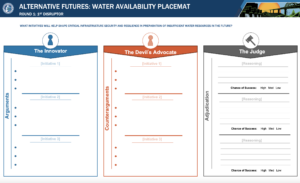The Department of Homeland Security has been organizing political "war-games” in preparation of climate change emergencies such as nationwide droughts and blackouts, War Room can reveal.
Dubbed “Scenario Based Planning,” these simulation exercises were assembled by the Cybersecurity and Infrastructure Security Agency’s (CISA) National Risk Management Center. CISA is a hotbed of election interference and has played a critical role in facilitating collaboration between social media companies and the federal government to censor content related to elections, COVID-19, Ukraine, and other topics.
Among the tabletop exercises drafted by CISA, revealed in a July 1st document uploaded to the agency’s website, are “Water Woes” and “Day Zero,” which predicts an energy shortage crisis.

Scenario Based Planning, according to CISA, operates “under the premise that we cannot successfully predict the future, we prepare for change by treating the future as a set of plausible alternatives.”
“By identifying and examining these alternatives, futures analysis can generate useful strategic foresight and influence proactive efforts to steer an organization toward preferred future alternatives,” a summary continues. This strategy holds a striking resemblance to the controversial "Event 201” pandemic planning event held by John’s Hopkins University and a host of globalist organizations – whose predictions came true shortly after with the COVID-19 pandemic.
The most recent scenario concocted by CISA relates to emergencies induced by climate change, a talking point common among globalist organization including the United Nations and World Economic Forum (WEF).
One Scenario – “Water Woes” – details how water could potentially become a scarce resource, resulting in political and social unrest. As CISA summarizes:
“Different regions of the United States increasingly find themselves threatened by either too much or too little water. In 2029, extreme weather has come to feel like the norm; the country is a patchwork of regions either inundated with floods and hurricanes or parched by drought and choked by wildfires. Three issues have exacerbated the challenges that jurisdictions face with water: (1) the growing effects of climate change; (2) aging water infrastructure; and (3) breakdowns in public trust. To date, efforts to address these issues have proven insufficient. Transitioning to clean energy, for example, to reduce greenhouse gas emissions and address climate change has been hindered by slower-than-expected adoption of electric vehicles, challenges with workforce development and reskilling, and a failure for new materials and greener processes to be incorporated at scale. A more moderate future will require an immoderate effort to address these issues moving forward.”
In a similarly styled political “Matrix Game,” CISA officials detail looming acts threatening water security such as “demographic shifts,” “the presence of novel contaminants (e.g., pharmaceutical byproducts, perfluorinated compounds, nanoplastics),” and “competition over water resources.”

In another war-game exercise created by CISA, the agency predicts energy shortages as a result of transitions to green energy.
The "Day Zero” simulation attempts to plan out how to best ration electricity and power:
"The city of Monroe declared that it has less than six months of water supplies remaining and must make drastic cuts that will harshly impact both citizens and businesses. However, Monroe is just one of many cities in the United States facing a likely water crisis. There are many stresses on water systems, but an underappreciated one is the demand from the energy sector. As the United States pursues the clean energy transition (i.e., investing in alternative fuels, photovoltaics, electric batteries, etc., with the goal of reducing carbon emissions), demand for energy is increasing and, at least in the short term, this is causing increased dependence on traditional sources of energy. Energy production is a water-intensive process, as is the production of necessary equipment. The author of the scenario’s fictitious essay advocates for approaching water resources more holistically: examining demand and exploring solutions across jurisdictions (where they draw from the same water sources) and sectors, most critically the energy and agriculture sectors.”
These unearthed simulations come amidst CISA playing a leading role in election security for the 2024 election.
Source link

